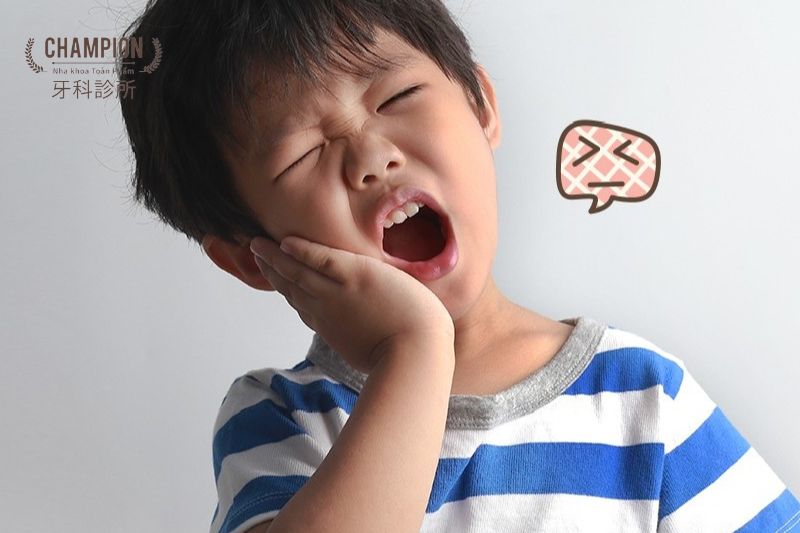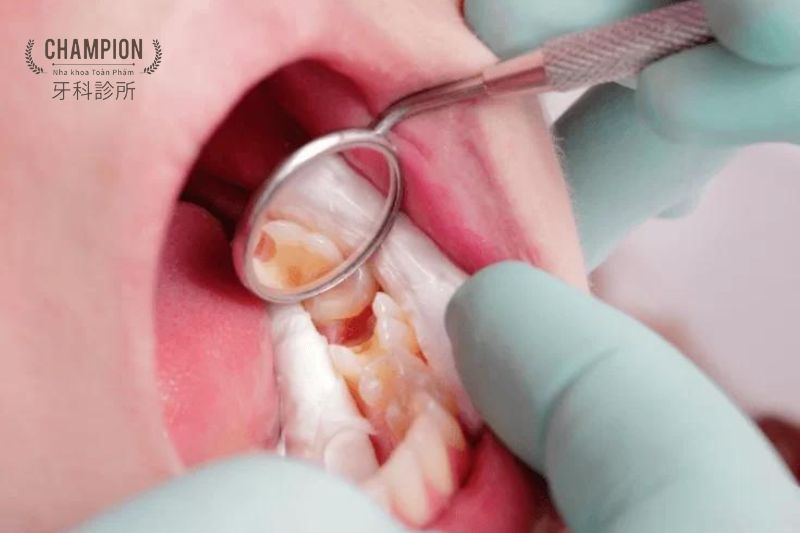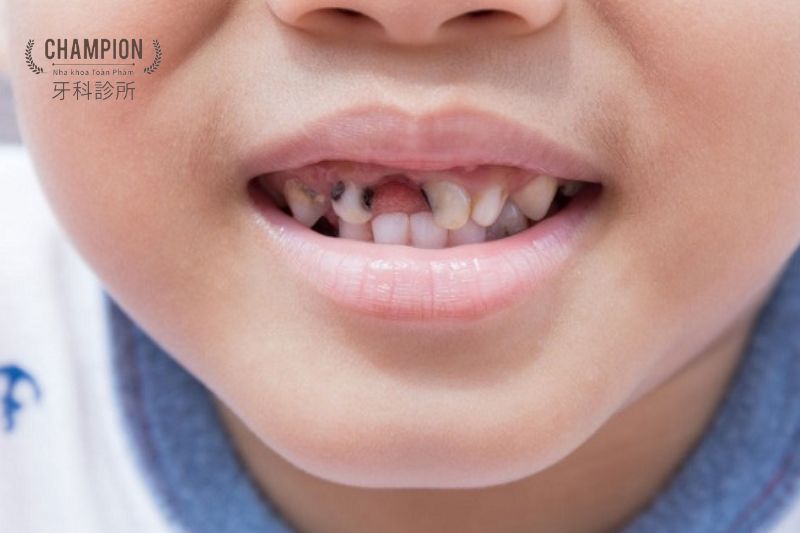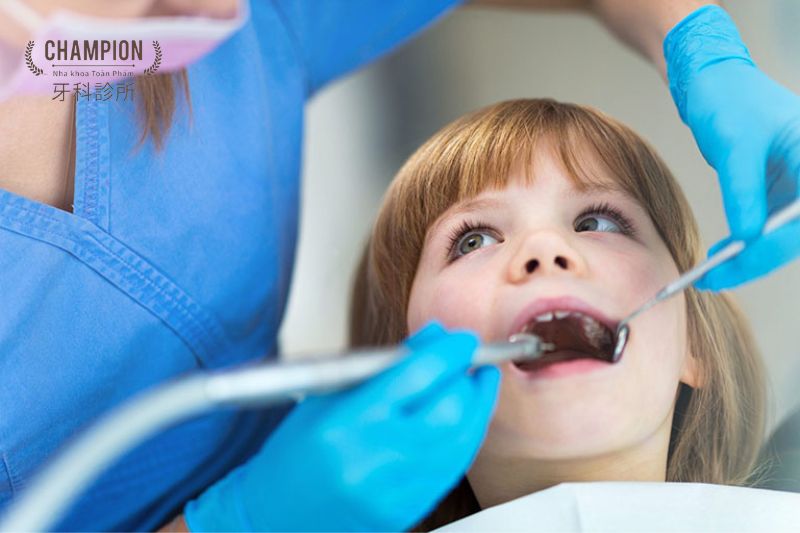The radiant smile of your little one suddenly fades away, replaced by sharp pains that make the child cry and become restless. Worried about these unusual symptoms, you may wonder if the "dental pulp monster" is wreaking havoc in that angelic smile. Don't be overly concerned; the following article from Champion Dental Clinic will help you recognize the signs of pulpitis in children and provide useful tips on effective care!
Causes of pulpitis in children
Cavities (Tooth decay)
Cavities, also known as dental caries or cracks, are one of the most common causes of pulpitis in children. When food containing sugar interacts with bacteria, acid is produced, affecting tooth enamel and leading to mineral loss, forming cavities. Bacteria can then penetrate through these cavities, reach the dental pulp, and cause infection.
Trauma
Tooth trauma is another significant cause of pulpitis in children. Children often engage in physical activities, sports, and accidents can lead to dental injuries. If the trauma damages the tooth enamel and directly exposes the dental pulp, bacteria can invade and cause infection.
Poor eating habits
Children's eating habits also play a crucial role in the development of pulpitis. Consuming sugary foods and sweets enhances the growth of harmful bacteria in the mouth, creating favorable conditions for the formation of cavities and infection.
Poor oral hygiene
If children are not properly instructed and supervised in maintaining oral hygiene, it can lead to plaque buildup and gum disease, creating an ideal environment for the growth of infection-causing bacteria. Ensuring that children brush their teeth correctly and regularly is important in preventing pulpitis.

Signs of pulpitis in children
To detect pulpitis in children, you can rely on the following signs:
- Severe toothache: Prolonged pain throughout the day and night, often worsening during eating or exposure to hot and cold foods. Sharp, throbbing pain may extend to the ear and jaw, causing difficulty in sleeping and constant crying.
- Tooth sensitivity: The child may fear brushing, touching the tooth, or experience sensitivity when chewing on an affected tooth.
- Swollen gum around the tooth: Inflamed, swollen, and red gums around the affected tooth may bleed when touched.
- Bad breath: Pulpitis allows food to accumulate in the tooth cavity, providing conditions for bacteria growth and causing bad breath.
- Mild fever, fatigue: In severe cases, children may experience mild fever and fatigue due to the spread of infection.

Should children have root canal treatment?
Pulpitis in children often arises from various causes, ranging from trauma to dental caries. When a child exhibits signs such as pain, swollen gums, or sensitivity to hot and cold foods, many parents question whether root canal treatment is necessary for children and how it affects their health.
According to dental experts, performing a root canal treatment in children when signs of pulpitis are detected will not have any negative impact. On the contrary, this process helps the child escape the pain caused by pulpitis, enabling normal eating and activities.
If a child's primary tooth undergoes pulp necrosis without timely root canal treatment, it can lead to significant consequences. The spread of necrosis can affect adjacent teeth, damage the surrounding tissue, and increase the risk of premature tooth loss.
When primary teeth are lost early, before the time for permanent teeth to erupt, it can affect the child's chewing and speech development. Particularly, the permanent tooth eruption pattern may be altered, causing misaligned or crowded teeth, posing challenges for dental care and aesthetic concerns.
Regarding the question of whether to perform root canal treatment in children, dental experts believe that it does not have any negative impact on the child's health. On the contrary, properly conducted root canal treatment helps the child avoid pain and ensures the development of healthy, beautiful teeth in the future.

>> See more: What happens if missing teeth aren't replaced? Consequences
How to treat pulpitis in children?
Pulpitis in children is not only painful for the child but also has general health implications. Here are some common treatment methods for cases where children have pulpitis:
Tooth extraction
In cases where the tooth is extensively damaged, inflammation has spread into the bone, and there is pus, tooth extraction may be a necessary choice to prevent the further spread of infection. If X-rays show that the tooth will naturally fall out within 6 months without affecting the permanent tooth, tooth extraction may also be considered.
The decision to extract a tooth when a child has pulpitis needs to be carefully made and discussed with a dentist. Depending on the specific condition of the tooth and the degree of inflammation, the dentist can choose the most suitable option to protect the child's health and the development of teeth and jawbone.
Root canal treatment
This method is considered the most effective and is often the preferred choice. Below is a detailed description of the root canal treatment procedure for children.
- Step 1: Examination and X-rays - Evaluate the condition of pulpitis and determine the length of the root canal, plan the treatment.
- Step 2: Mouth Cleaning and Anesthesia - Remove bacteria and excess food, administer anesthesia to prepare for the root canal procedure.
- Step 3: Rubber Dam Placement - Prevent chemicals and soft tissue from the root canal from falling into the digestive tract.
- Step 4: Pulp Removal and Canal Filling - Open the canal, remove the dead pulp, then shape the artificial root canal and fill the pulp chamber with Gutta Percha material.

Preventive measures for pulpitis in children
Pulpitis is a common issue in children, but by implementing effective preventive measures, parents can help protect their child's primary teeth. Here are detailed guidelines for preventing pulpitis in children:
Proper brushing habits
Children primarily get pulpitis due to habits and preferences for sweet foods, combined with improper oral care causing cavities. To prevent pulpitis in children, parents should pay attention to measures such as brushing teeth at least twice a day, using a soft-bristle brush,...
Use dental floss and mouthwash
For maintaining oral hygiene, using dental floss and mouthwash also plays a crucial role. Using dental floss effectively cleans between teeth and prevents bad breath. Mouthwash containing fluoride can help protect teeth from acid attacks and provide minerals for tooth enamel.
Choose foods and drinks wisely
Diet also plays a crucial role in preventing pulpitis. Measures include:
Limiting sugary foods: Restricting the consumption of sugary foods such as sweets, carbonated drinks, and fast food reduces the risk of tooth decay.
Encouraging consumption of vegetables and fruits: Encourage children to eat plenty of fresh vegetables and fruits to provide fiber and essential nutrients supporting dental health.
Regular dental check-ups
Finally, to ensure good oral health control, regular dental check-ups are extremely important. Maintaining regular dental check-ups every 6 months helps monitor oral health and timely detect any issues that may arise.
Treating pulpitis in children not only helps protect primary teeth but also lays the foundation for the development of permanent teeth and jaw. We hope this article from Champion Dental will help you better understand the condition of pulpitis in children. Do not hesitate to contact Champion Dental for support, consultation, and timely check-ups.
Vietnamese & English: (028) 5411-2295
中文: (028) 5411-2297 172 Nguyen Luong Bang, Tan Phu Ward, District 7, Ho Chi Minh City.
Fanpage: Champion Dental Clinic 牙科診所
Zalo: Champion Dental Clinic
Youtube: Champion Dental Clinic 牙科診所
 Champion Dental Clinic
Champion Dental Clinic



